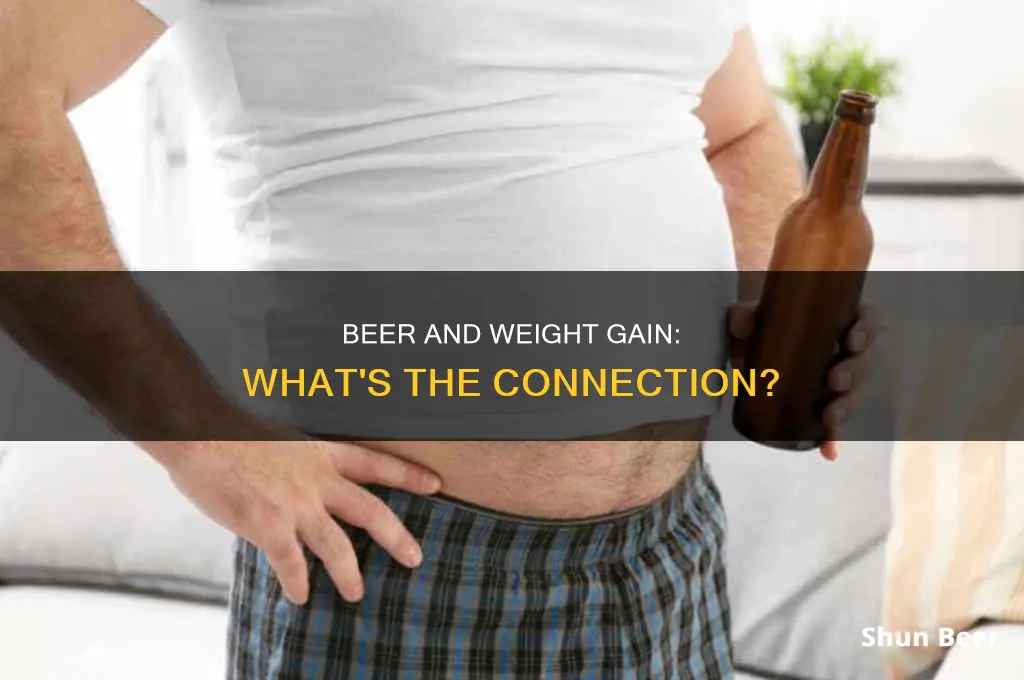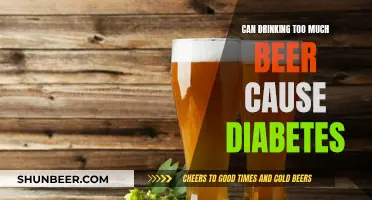
Beer and weight gain are linked, but it's not inevitable that you'll gain weight from drinking beer. It's all about how much you drink, how often, and other factors like your body, lifestyle, and what you eat when you drink. Beer is often blamed for weight gain because it's so easy to drink a lot of it, and it's high in calories. Alcohol also stops your body from burning fat, and it can make you feel hungrier.
What You'll Learn

Beer is high in calories and can lead to weight gain
Beer is often referred to as "empty calories" because it contains calories but lacks nutritional value. When consumed frequently or in excess, these empty calories can lead to weight gain and contribute to belly fat. The more alcohol you drink, the higher the chance you will develop a "beer belly".
Beer also contains alcohol, which has about seven calories per gram. This is higher than carbs and protein (four calories per gram) but lower than fat (nine calories per gram). The higher the alcohol content in a beer, the more calories it contains.
In addition to the calories from alcohol and carbohydrates, beer can also increase your appetite. The food typically eaten with beer, such as pizza, wings, and other fried foods, can also be high in calories.
Drinking beer can also disrupt your sleep patterns, which can negatively impact your overall health and hinder your fitness and weight loss goals.
To prevent weight gain while drinking beer, it is important to drink in moderation, make mindful choices about beverage types and portion sizes, and maintain a balanced diet and regular physical activity.
Non-Alcoholic Beer: Safe for Minors in Canada?
You may want to see also

Alcohol can prevent your body from burning fat
The body considers ethanol, the organic compound produced during fermentation, a toxin or waste product. In response, it will shut down all other metabolic pathways until the alcohol is out of your system. This process can take up to 36 hours, during which time your body will not be burning any fat.
Alcohol also affects your hormones, impairing the functions of your glands that release hormones related to your body's stress response, energy, and metabolism. For example, heavy drinking may cause your adrenal glands to secrete higher levels of cortisol, a stress hormone. Elevated cortisol levels have been linked to increased abdominal weight gain and cravings for high-calorie foods.
Additionally, alcohol can negatively impact your sleep quality and duration. Sleep deprivation may lead to increased food consumption and a higher risk of weight gain.
Finally, alcohol affects digestion and nutrient uptake, causing stress on the stomach and intestines and resulting in decreased digestive secretions and impaired absorption of nutrients. This can further affect the metabolism of organs involved in weight management.
Beer Caramelizer: How Does It Work and Why?
You may want to see also

Beer can increase your appetite and cravings for unhealthy food
Several factors contribute to this. Firstly, alcohol suppresses the oxidation of fatty acids, which increases feelings of hunger as fatty acids play a role in appetite regulation. Secondly, alcohol increases thermogenesis or calorie utilisation for heat production, which means you may feel hungry again faster than usual. Thirdly, alcohol stimulates or inhibits neurochemical systems that regulate appetite. It affects the hormones Leptin and GLP-1, which suppress appetite and are inhibited when alcohol enters the body, resulting in feelings of hunger. Alcohol also stimulates the same neurons in the brain that are triggered when the body goes into starvation mode, which can lead to ethanol-induced overeating.
The combination of alcohol's impact on the body's hunger signals and its reduction of self-control means that indulging in food cravings and overeating after drinking is common. Research has shown that people will consume more at meals when they drink alcohol or have been drinking beforehand. Alcohol also influences hormones tied to satiety, or feeling full. For example, it may inhibit the effects of leptin, a hormone that suppresses appetite, and glucagon-like peptide-1 (GLP-1), a hormone that inhibits food intake.
Alcohol can also lower blood sugar, which can cause cravings for sugar and carbohydrates. It impairs the liver's ability to release the right amount of glycogen or stored glucose into the blood to keep blood glucose levels stable. This is particularly risky for people with diabetes, who are at a higher risk for low blood sugar levels when drinking alcohol, especially on an empty stomach.
Additionally, alcohol affects sleep duration and quality, and sleep deprivation may also contribute to weight gain. Research suggests that sleep-deprived people eat more food and find it harder to resist tempting snacks.
Beer: A System Cleanser or Just a Myth?
You may want to see also

Beer contains phytoestrogens, which may increase the risk of storing belly fat
Beer is an alcoholic drink made from grains such as barley, wheat, or rye, fermented with yeast. The flowers of the hop plant are used to give beer its flavour. This plant is known to be very high in phytoestrogens, plant compounds that can mimic the female sex hormone oestrogen in the body.
It has been suggested that the hops in beer might cause hormonal changes in men that increase the risk of storing belly fat. However, it is unclear whether men who drink beer are exposed to higher levels of phytoestrogens and how these plant compounds affect their weight or belly fat.
In 1951, two German researchers found that women who handle hops start menstruating, and they discovered estrogenic activity in hops. They found trace amounts of the soy phytoestrogens but in such small quantities that beer would not be expected to have an estrogenic effect. However, in 1999, a potent phytoestrogen called 8-prenylnaringenin was discovered in hops, which is fifty times more potent than the genistein in soy. This provides an explanation for the menstrual disturbances in female hop workers.
In 2001, a study on a hops-containing dietary supplement for breast enhancement raised concerns that a phytoestrogen in hops called isoxanthohumol might be converted by the liver into the more potent 8-PN, which would greatly increase the estrogenic effect of hops. This study was conducted on mice, and thankfully, a study using human estrogen receptors found no such liver transformation. However, in 2005, it was discovered that the human colon contains trillions of microorganisms with enormous metabolic potential, and when beer was mixed with human colon contents, up to a 90% conversion of isoxanthohumol to 8-PN was achieved. This explains why 8-PN can be detected in the urine of beer drinkers for days.
While the effects of phytoestrogens in beer on belly fat are unknown, it is important to note that drinking large amounts of beer has been linked to an increased risk of weight gain and belly fat. The more you drink, the higher your risk of gaining weight and developing a "beer belly."
Beer and Bowel: Friend or Foe?
You may want to see also

Drinking beer is linked to various health risks
The health risks associated with drinking beer go beyond potential weight gain. Firstly, heavy drinking can affect your hormones, impairing the functions of glands that release hormones and causing weight gain. For example, heavy drinking may cause elevated cortisol levels, which increase abdominal weight gain and cravings for high-calorie foods. Secondly, alcohol can make you feel hungry by reducing your blood sugar levels, leading to increased appetite and cravings for high-carb foods. Thirdly, drinking beer can disrupt your sleep patterns, negatively impacting your overall health and weight loss goals. Finally, drinking beer is associated with an increased risk of developing serious health conditions, including high blood pressure, insulin resistance, heart disease, stroke, liver disease, and certain types of cancer. Therefore, it is important to monitor your beer consumption and maintain a healthy and active lifestyle to minimise these health risks.
Great Wolf Lodge: Beer Drinking Rules Explained
You may want to see also
Frequently asked questions
Yes, drinking beer can increase weight. Beer is high in calories and can contain as many calories as a soft drink. It is also an alcoholic drink, and alcohol can prevent your body from burning fat.
Beer causes weight gain by increasing your calorie intake and preventing your body from burning fat. Beer also contains phytoestrogens, plant compounds that can mimic the female sex hormone oestrogen, which may increase the risk of storing belly fat in men.
A "beer belly" is a term used to describe the increase in fat around the belly or abdominal area due to drinking beer or other alcoholic beverages. This type of fat is linked to various health problems, including type 2 diabetes, high blood pressure, and cardiovascular disease.
To prevent weight gain from drinking beer, it is recommended to drink in moderation, opt for light or low-calorie beers, stay hydrated with water, and avoid high-calorie meals and snacks. It is also important to maintain a healthy diet and regular physical activity.







